Abstract
Magic Eden is a multi-chain NFT trading market created by a team with a Chinese background. Established on the Solana chain in 2021, it quickly expanded to support Ethereum (ETH), Polygon, BASE, and Bitcoin (BTC) ecosystems. Despite the downturn in the NFT market, Magic Eden has successfully captured a significant market share on the Solana chain through rapid product iteration and rich feature design.
The platform's core features include an NFT trading market, multi-chain support, a project incubator (Launchpad), staking and reward incentives, an aggregated market, data analysis and rankings, wallet integration, community governance (DAO), and API integration. Additionally, Magic Eden offers unique features such as limited-time promotions, a rarity scoring system, on-chain identity verification, membership passes, bulk trading, and custom bundles. Through these value-added services and detailed data support, Magic Eden has lowered the entry barrier for new users, optimized the trading experience, and enhanced user retention on the platform.
Magic Eden's main revenue sources include transaction fees and service fees from Launchpad projects. Although it has not issued a token, the platform has launched a points system where users can accumulate points through platform activities for future airdrops. By the end of 2024, the platform also introduced a test token $TestME, aimed at testing the issuance process for the future official token $ME.
In the context of an overall sluggish NFT market, Magic Eden remains competitive, with its growth potential primarily stemming from support for the BTC ecosystem, which is still a blue ocean market. If NFTs on the BTC chain become popular, Magic Eden is expected to welcome broader development space in the future, further consolidating its leading position in the multi-chain NFT trading market.
Project Introduction
Magic Eden is a multi-chain NFT trading market with a Chinese background. In the context of a severely shrinking NFT sector, it has gradually captured a large portion of the market share due to its rapid iteration engineering advantages. Recognizing the development of the Solana public chain, Magic Eden was initially created on the Solana chain in 2021. Subsequently, Magic Eden expanded to support the ETH ecosystem, Polygon ecosystem, BASE ecosystem, and BTC ecosystem.
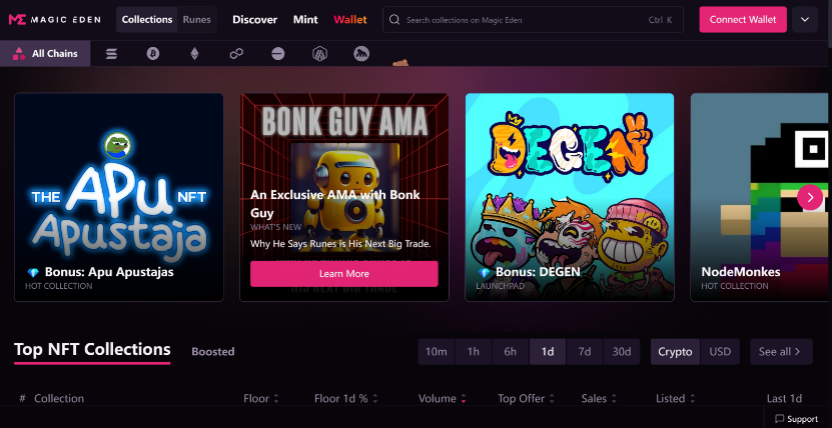
Figure 1 Magic Eden
Data Source: Magic Eden
1. Magic Eden Platform Features:
Magic Eden is no longer just an NFT trading market; due to business expansion, it currently has the following features:
NFT Trading Market: Provides a user-friendly interface for browsing, buying, selling, and auctioning NFTs. Users can filter by price, rarity, popularity, etc.
Multi-Chain Support: Not only supports the Solana ecosystem but also extends to Ethereum and Bitcoin ecosystems, allowing users to create and trade NFTs across different chains.
Launchpad: This is a platform for incubating and issuing new NFT projects. Through the Launchpad, project teams can receive support to more easily issue and promote NFTs, while users have the opportunity to purchase in advance.
Staking and Rewards: Users can stake their NFTs to earn rewards (such as tokens or other NFTs), thereby increasing the holding value of the NFTs.
Aggregated Market: This feature aggregates trading listings from other NFT platforms, helping users find trading prices and supplies from major NFT markets on one platform.
Analysis Tools and Rankings: Provides market analysis, trading trends, and NFT collectible rankings, helping users understand popular NFT projects and market movements.
Wallet Integration: Compatible with various crypto wallets, making it convenient for users to deposit, withdraw, and trade.
DAO and Community: Magic Eden has a community governance and discussion platform where users can participate in DAO voting and propose suggestions for platform development.
API Integration: Provides APIs for developers to integrate into other applications, enhancing the platform's ecosystem.
2. Unique Features of Magic Eden:
In the main NFT trading area, Magic Eden has expanded more user-friendly features:
Limited-Time Promotions: Magic Eden periodically launches limited-time promotional events, allowing users to purchase specific NFTs at discounts or special prices within a specified time. These limited-time offers increase trading activity and give users the chance to acquire high-quality NFTs at lower costs.
Dynamic Rarity Scoring System: To help users quickly assess the rarity of NFTs, Magic Eden has designed a dynamic rarity scoring system. When browsing NFTs, users can view their rarity level or score in real-time, allowing them to determine the rarity of an NFT within the entire series. This is particularly helpful in deciding whether to bid high or purchase directly.
On-Chain Identity and Verification: To enhance transaction security, Magic Eden allows project teams to perform on-chain identity verification for their NFT series, ensuring authenticity. The platform displays "Verified" or "Not Verified" labels, allowing users to confidently purchase certified genuine NFTs and avoid counterfeit assets.
Magic Eden Pass Membership Features: Magic Eden has issued a membership pass NFT (Magic Eden Pass), granting holders a series of exclusive benefits, such as priority purchasing, trading discounts, and limited collectible airdrops. This membership mechanism incentivizes users to remain active on the platform long-term.
Bulk Trading and "Instant Sale": Magic Eden supports bulk buying and selling of NFTs, allowing users to trade multiple NFTs at once, suitable for large collectors or investors. At the same time, the platform has introduced an "Instant Sale" feature, enabling users to sell their NFTs immediately at the lowest price offered by the platform, quickly realizing their assets.
Custom NFT Collection Bundles: Magic Eden offers a unique custom collection bundle feature, allowing users or project teams to create and sell bundles containing multiple NFTs, grouping related NFTs together for sale at a higher price. This approach attracts collectors and users interested in specific themes.
NFT Staking and Revenue Distribution: Users can stake their NFTs on the platform to earn income or participate in revenue-sharing projects. For example, staking game-related NFTs can yield in-game rewards or profit sharing. This feature enhances the investment attributes of NFTs, allowing users to generate income during their holding period.
"Minting" Window: Magic Eden provides a unique "minting window" feature for certain popular projects, opening the minting (creation) of new NFTs for a specific short period. This limited-time minting allows users to acquire NFTs at the original price rather than purchasing them at a premium on the secondary market.
Personalized Recommendations Based on On-Chain and Off-Chain Data: Magic Eden utilizes on-chain and off-chain data (such as community activity and holder data of projects) to provide users with personalized NFT recommendations. Users not only see NFTs they are interested in but also receive suggestions to explore new projects or trends, enhancing the efficiency of discovering potential NFTs.
3. Magic Eden Revenue:
Like other NFT trading markets, Magic Eden's main revenue comes from two aspects: transaction fees from platform users and service fees from launched projects.
Transaction Fees: Magic Eden charges a transaction fee on each NFT trade, typically 2% of the transaction amount. This is its primary source of income.
Launchpad Fees: Magic Eden's Launchpad platform assists new projects in issuing and promoting NFTs. Project teams using the Launchpad must pay a certain service fee or receive a portion of the issuance amount as compensation. The Launchpad provides project teams with resources such as platform exposure, promotional support, and on-chain verification, thus charging higher fees.
The Rise of Magic Eden
Magic Eden launched in September 2021, and on a day in May 2022, its daily trading volume surpassed that of OpenSea, which was valued at $13 billion at the time. What enabled a new platform created in less than a year to surpass a five-year-old industry leader in under a year? This is closely related to the prosperity of the Solana ecosystem and the NFT market at that time. However, more importantly, it is due to Magic Eden's unique product design.
1. Detailed User Guidance:
Magic Eden was born in a bull market, with a large influx of new users who had never traded cryptocurrencies or used decentralized wallets before. They were primarily interested in NFTs. This posed a significant challenge for newcomers. Therefore, Magic Eden provided detailed onboarding guidance from the very beginning, offering step-by-step instructions from wallet creation to the first NFT purchase, along with a complete set of video tutorials. This greatly reduced the difficulty for users to enter the market.
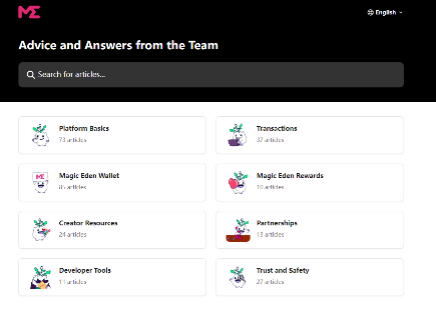
Figure 2 Magic Eden Help Center Article
Data Source: Magic Eden
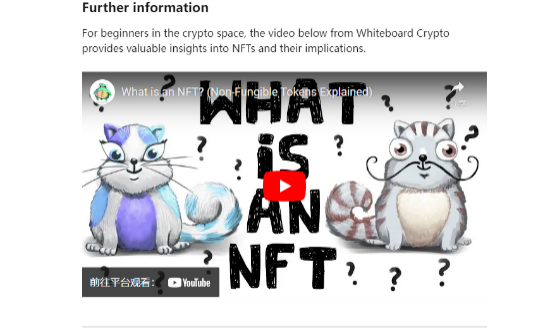
Figure 3 What is an NFT
Data Source: Magic Eden
2. Detailed Data of the Magic Eden NFT Market:
In addition to providing good user guidance, Magic Eden's advantage lies in the detailed data provided by the platform.
I remember when I first played on OpenSea, the basis for purchasing was often based on how visually appealing the NFT was. Since everyone's aesthetic standards differ, the path to success could not be replicated. After entering Magic Eden, it set up features like popular NFT series, release calendars, and data statistics dashboards, allowing players to directly track and research the projects they are interested in on the platform, making trading decisions and asset allocations in a closed loop. There was no need to go to other platforms to check the data of various NFT series. Users transitioned from trading aesthetics to the era of trading data.
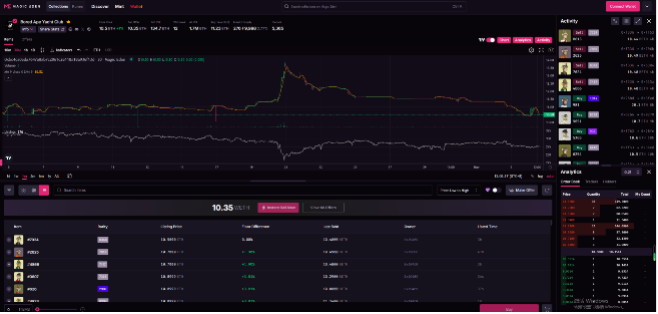
Figure 4 Magic Eden Trading Panel
Data Source: Magic Eden
This is the advantage of the team's background; team members come from major Web2 companies like Google, Meta, and Uber. They deeply understand the importance of product design for projects and have polished a relatively mature project from the start.
Track Analysis
The NFT sector emerged in 2021. With the explosion of Bored Apes, the sector reached its peak. However, with the arrival of the bear market, the decline of NFTs has been more severe compared to fungible tokens (FTs). According to data from NFTScan:
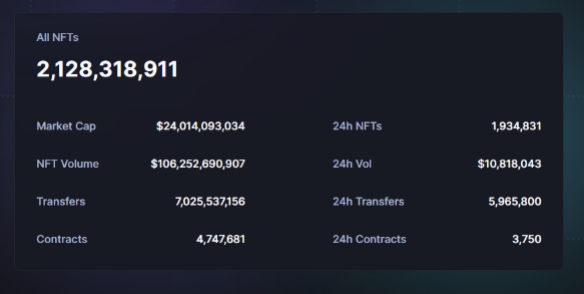
Figure 5 NFT Market Data
Data Source: NFTscan
Currently, a total of 2.1 billion NFTs have been issued, with a market value of $24 billion, but the 24-hour trading volume is less than $10 million. The vast majority of NFTs are in a state of being priced but not traded. There is no doubt that we are still in a deep bear market for NFTs, with the total trading volume of all NFTs not surpassing the daily trading volume of a popular meme coin. Moreover, due to the inherent limitations of NFTs, they cannot be directly listed on centralized exchanges. This not only deprives NFTs of more endorsements but also causes them to lose a lot of liquidity. Centralized exchanges can only create separate NFT markets, but these markets often attract very few users. Currently, liquidity is almost non-existent. However, the blockchain itself is continuously evolving towards decentralization and on-chain development. Currently, the number of active users on-chain is only about one-tenth of that on centralized exchanges, indicating significant growth opportunities. The NFT sector will also undergo a paradigm shift as centralized exchanges transition to decentralized exchanges, leading to an explosion in growth. Following this reasoning, the NFT sector is expected to explode in the later stages of a bull market, resulting in a diversion of funds and a decline in token prices on centralized exchanges. Therefore, paying attention to the development of the NFT sector can help one better grasp market rhythms and adjust their positions accordingly.
Currently, the most important application in the NFT sector remains the NFT market. OpenSea, which was born in 2017, has experienced over seven years of development. There are now 238 trading markets across all chains.
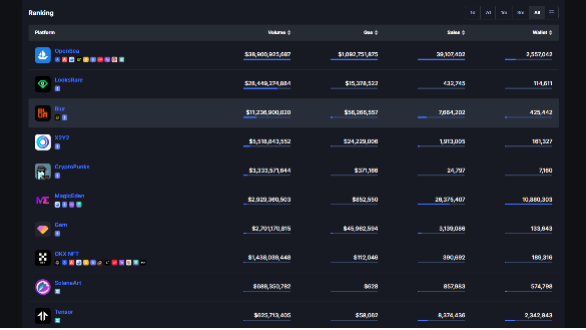
Figure 6 NFT Market Data
Data Source: NFTscan
As of October 31, 2024, the top ten NFT markets include four that have issued tokens, and eight markets involve the Ethereum chain. Let's compare a few representative markets:
OpenSea, Blur, Magic Eden, and OKX NFT. OpenSea ranks first in both historical and recent trading volumes. Apart from OpenSea, the other three markets have achieved their current overall trading volumes due to token incentives (trading volume to earn NFTs). Although Magic Eden also has a points mechanism, it differs from directly issuing tokens for incentives. From this perspective, Magic Eden is actually the second in the market.
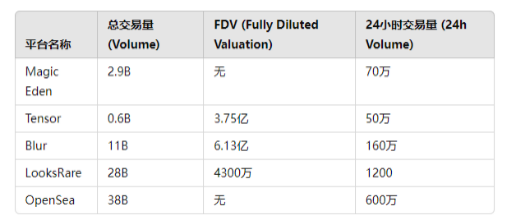
Figure 7 NFT Market Data
Data Source: NFTscan
From the trading volume comparison, it can be seen that Magic Eden is on the same tier as Tensor, with their 24-hour trading volumes being of the same magnitude.
In terms of product strength, Magic Eden's product capabilities are clearly stronger. Magic Eden has launched its own wallet. In the blockchain era, due to the nature of wallet connections, most users have no loyalty to projects because the migration cost is too low. Therefore, many projects have launched loyalty programs, hoping users will remain on their platforms, especially various NFT platforms. If your orders are all on their exchange, you will have 100% loyalty and enjoy the best rates and rewards. However, using a project’s wallet is clearly a higher-level strategy because once you use their wallet, you inevitably become accustomed to using their exchange.
Token Economic Model
Vision: $ME is used for staking rewards, governance participation, and ecological contributions, aiming to enhance platform trading volume and user activity.
Total Token Supply and Release:
Total Supply: 1 billion tokens.
Release Plan: Gradual release to maximize circulation time and ensure economic stability.
Distribution Ratio:
Community and Ecology: 37.7%, including rewards for users and ecological development.
Initial Distribution: 12.5%, through initial token distribution (TGE), with unclaimed portions redistributed to the reward pool.
Contributors: 26.2%, locked for 18 months to incentivize long-term participation from the team and advisors.
Strategic Participants: 23.6%, locked for 12 months to attract key partners.
Security: Ensured through multi-signature wallets and a security committee to guarantee transparency and safety in token usage.
Recently, the project team launched a test token $TestME, with the claiming period from 11 AM to 5 PM Pacific Standard Time on October 29 to October 31, after which the remaining supply will be destroyed.
The official launch of the test token has two purposes:
To help users familiarize themselves with the token claiming process.
To help the official team identify and resolve any potential issues before the issuance of the $ME token.
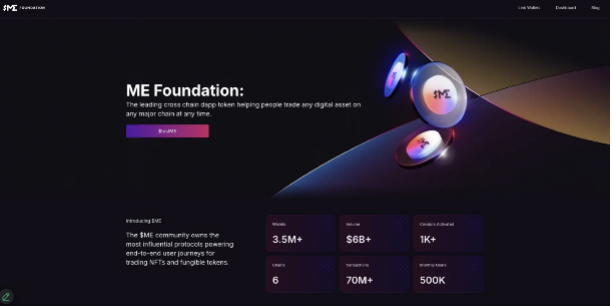
Figure 8 Claiming Test Token $TestME Interface
Data Source: Magic Eden
This is the interface for claiming the test token, which has now closed. A total of 250,000 wallets participated in the claiming, and the claiming enthusiasm was very high. To claim the test token, users need to download the Magic Eden wallet and meet the following conditions:
A wallet that has recently used the Magic Eden platform or has purchased, sold, or accepted bids in the past six months, with at least one transaction exceeding $100.
Randomly selected users who have recently traded tokens on-chain.
Team Background
CTO: Sidney Zhang
In 2013, Sidney founded his first cryptocurrency company, starting a cryptocurrency business focused on Bitcoin developer APIs. In 2015, he joined Uber as one of the founding engineers of Uber Eats, working from the ground up until it took off. Sidney then worked for a few years in Uber's Advanced Technologies Group, focusing on autonomous driving production modeling and research, specializing in computer vision and prediction. Finally, he joined Facebook's artificial intelligence team and later co-founded Magic Eden.
CEO: Jack Lu
Jack entered the cryptocurrency field in 2013 when he began hacking Bitcoin wallet applications. Before co-founding Magic Eden, Jack worked as a product manager at a cryptocurrency exchange and Google, and served as a consultant at Boston Consulting Group.
COO: Zhuoxun Yin
Since 2017, Zhuoxun has been working full-time in the cryptocurrency industry. He was the second employee at dYdX and a senior product manager at Coinbase. Before entering the cryptocurrency industry, he worked in strategic roles at early-stage companies and provided consulting services to corporate clients at Bain & Company.
CE: Zhuojie Zhou
Rex began his cryptocurrency journey around 2014, engaging in cryptocurrency mining. He was an early engineer at Uber and Checkr, and recently served as a senior engineer at Facebook AI, responsible for developing PyTorch Dev Infra, before co-founding Magic Eden. He is passionate about the open-source developer community and has created Flagr, OpenMock, Open Privacy Vault, and DSRHub. Rex is also one of the community champions of Kong API Gateway.
Investment and Financing Background
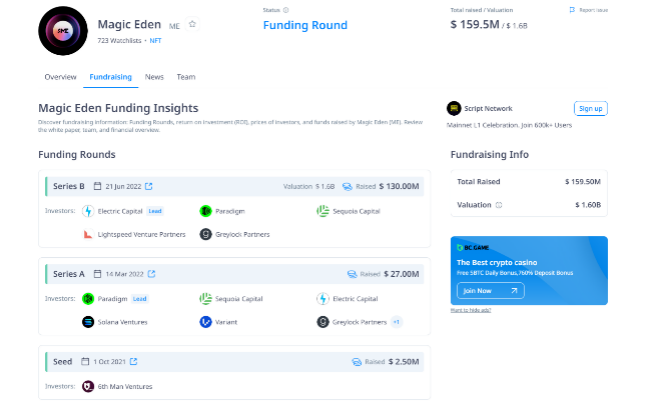
Figure 9 Magic Eden Financing Details
Data Source: CryptoRank
Financing Details:
Seed Round: On October 1, 2021, the investment firm "6th Man Ventures" invested $2.5 million.
Series A: On March 14, 2022, investments of $27 million were made by Paradigm, Sequoia Capital, Solana Ventures, and others.
Series B: On June 21, 2022, investments of $13 million were made by Electric Capital, Paradigm, Sequoia Capital, and others.
Overall, Magic Eden raised $159 million at a valuation of $1.6 billion.
Project Prospects and Outlook
The most promising potential in the NFT sector currently lies in the BTC ecosystem, as the total market value of NFTs on other chains is significantly higher than that of the BTC ecosystem. Currently, Magic Eden is the only platform supporting the BTC ecosystem.
The development of NFTs on other chains will only rebound and grow due to the overflow of funds from FTs when a bull market arrives. The BTC ecosystem is still in a blue ocean stage of growth. Therefore, it can be said that Magic Eden is a unicorn in this sector. As long as BTC NFTs gain widespread recognition among users, the growth of Magic Eden will open up a new ceiling.
免责声明:本文章仅代表作者个人观点,不代表本平台的立场和观点。本文章仅供信息分享,不构成对任何人的任何投资建议。用户与作者之间的任何争议,与本平台无关。如网页中刊载的文章或图片涉及侵权,请提供相关的权利证明和身份证明发送邮件到support@aicoin.com,本平台相关工作人员将会进行核查。




